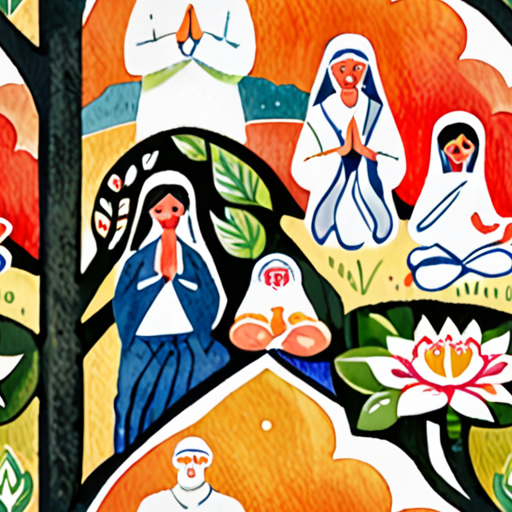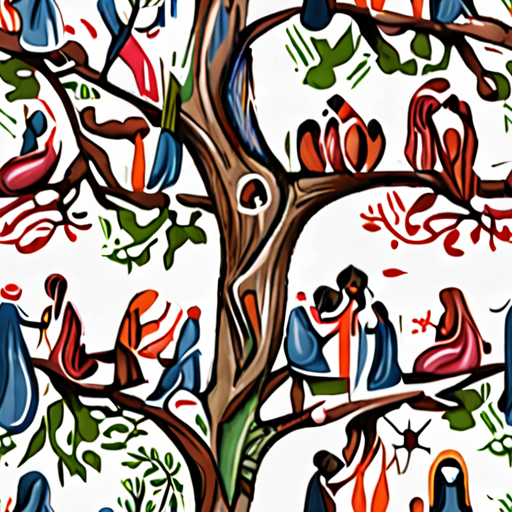In today’s increasingly interconnected world, fostering harmony through interfaith initiatives has become more crucial than ever. As people from diverse religious backgrounds come together to share their perspectives and experiences, they can break down barriers and build bridges of understanding. By exploring the power of dialogue and cooperation, we can unlock new opportunities for peaceful coexistence and collaborative problem-solving. From community-based initiatives to educational programs, there are countless ways to engage in meaningful interfaith dialogue and promote mutual respect among people of different faiths.

What is an Interfaith Initiative?
An interfaith initiative is a collaborative effort between people of different religious backgrounds aimed at promoting mutual understanding, respect, and cooperation.
- We believe that by working together, we can foster greater empathy and tolerance among diverse communities, ultimately leading to a more harmonious and inclusive society.
- At The Sacred Heart Church, we recognize the importance of interfaith dialogue in breaking down barriers and bridging cultural divides.
Key Principles of Interfaith Initiatives
- Respect and Understanding: We strive to create a safe and respectful space for open discussion and exchange of ideas, allowing participants to share their perspectives and learn from one another.
- Cultural Sensitivity: Our initiatives take into account the unique cultural and religious contexts of participating groups, ensuring that our efforts are sensitive and responsive to their needs.
- Collaboration and Partnership: We work closely with local organizations, community leaders, and individuals to develop and implement effective interfaith initiatives that benefit everyone involved.
Benefits of Interfaith Initiatives
- Better Community Relations: By fostering greater understanding and cooperation among diverse groups, interfaith initiatives can lead to improved community relations and a stronger sense of social cohesion.
- Increased Empathy and Tolerance: Through shared experiences and open dialogue, participants in interfaith initiatives can develop greater empathy and tolerance for one another’s differences.
- Personal Growth and Development: Engaging in interfaith initiatives can be a transformative experience, helping individuals to broaden their perspectives, challenge their assumptions, and deepen their understanding of themselves and others.
Examples of Successful Interfaith Initiatives
- The Interfaith Youth Core (IFYC): A national organization that empowers young people to build bridges between different faith traditions and promote social justice.
- The World Council of Churches (WCC): An international fellowship of churches that works towards unity, justice, and peace among Christians worldwide.
Getting Involved in Interfaith Initiatives
If you’re interested in getting involved in interfaith initiatives, consider reaching out to local organizations or community groups that align with your values and interests.
You can also start by attending events, joining online forums, or volunteering for projects that bring people together across different faith traditions.
Remember, every small step counts, and collective efforts can lead to significant positive change in our communities and beyond.
What Are Interfaith Activities?
At The Sacred Heart Church, we believe that interfaith activities play a vital role in building bridges between communities and fostering greater understanding and respect.
- We define interfaith activities as efforts to bring people of diverse faith backgrounds together to promote mutual understanding, respect, and cooperation.
- These activities aim to break down barriers and stereotypes, encouraging open dialogue and collaboration among people from different religious traditions.
The Importance of Interfaith Activities
Interfaith activities have numerous benefits, including:
- Fostering greater empathy and understanding among people of different faiths
- Encouraging peaceful coexistence and conflict resolution
- Promoting social justice and human rights
- Supporting education and cultural exchange
Examples of Interfaith Activities
Some examples of interfaith activities include:
- Community events and festivals celebrating diverse cultures and faiths
- Dialogue and discussion groups focused on exploring common values and interests
- Volunteer opportunities and service projects bringing people together to address social issues
- Cultural exchange programs and language classes promoting cross-cultural understanding
Getting Involved in Interfaith Activities
If you’re interested in getting involved in interfaith activities, consider the following steps:
- Research local organizations and initiatives promoting interfaith dialogue and cooperation
- Attend community events and meetings to learn more about interfaith activities in your area
- Reach out to local leaders and organizations to express your interest and offer your skills and talents
- Participate in volunteer opportunities and service projects that align with your values and interests
Conclusion
By participating in interfaith activities, we can work towards creating a more harmonious and inclusive society, where people of all faiths and backgrounds feel valued and respected.

Examples of Interfaith Work
We believe that interfaith work is essential in today’s diverse society, bringing people together to promote understanding, respect, and cooperation.
-
The Inter Faith Network
A national organization working to improve knowledge and understanding between religions, we appreciate their efforts in promoting dialogue and collaboration among different faith communities.
-
Local Community Initiatives
In our own community, we have seen the positive impact of interfaith work through local initiatives that bring people together to tackle social issues and promote mutual understanding.
-
The Sacred Heart Church’s Interfaith Program
We are proud to offer an interfaith program that brings together people of different faith backgrounds to learn from each other, share experiences, and work towards common goals.
-
Campaigns Against Religious Violence
We believe that interfaith work is crucial in preventing religiously-motivated violence and promoting peace and harmony in our community.
-
Community Outreach and Education
Our interfaith program includes community outreach and education initiatives that aim to promote understanding and respect among people of different faith backgrounds.
We strive to create a welcoming environment where individuals can explore their spirituality, connect with others, and make a positive impact in the world.
As part of our commitment to interfaith work, we partner with other organizations and community groups to promote understanding, respect, and cooperation among people of different faith backgrounds.
Some examples of our interfaith work include:
-
Hosting interfaith events and workshops
We regularly host events and workshops that bring together people of different faith backgrounds to learn from each other and share experiences.
-
Developing interfaith educational materials
We develop educational materials that promote understanding and respect among people of different faith backgrounds.
-
Fostering partnerships with other organizations
We partner with other organizations and community groups to promote interfaith understanding and cooperation.
We believe that interfaith work is essential in building a stronger, more compassionate community, and we are committed to continuing our efforts in this area.

What is an Interfaith Program?
An interfaith program is a collaborative effort that brings together individuals from diverse religious backgrounds to work towards a common goal.
- We believe that by embracing our differences and working together, we can create a more compassionate and inclusive community.
- At The Sacred Heart Church, we strive to foster an environment that values and respects the diversity of our members’ beliefs and traditions.
Key Principles of Interfaith Programs
- Collaboration: Interfaith programs encourage cooperation and mutual understanding among participants from various faith backgrounds.
- Diversity: These programs celebrate the richness of diverse perspectives and experiences, recognizing that each individual has something unique to offer.
- Inclusivity: Interfaith programs aim to create a sense of belonging among participants, regardless of their background or affiliation.
- Education: These programs often involve learning opportunities, workshops, and discussions that promote cross-cultural understanding and empathy.
Benefits of Interfaith Programs
- Better Understanding: Interfaith programs help break down stereotypes and misconceptions, fostering greater understanding and respect among people of different faiths.
- Community Building: These programs bring people together, creating a sense of community and social connection among participants.
- Social Impact: Interfaith programs often address pressing social issues, such as poverty, inequality, and environmental degradation, promoting collective action and positive change.
Examples of Successful Interfaith Programs
- The Interfaith Youth Core (IFYC): A national organization that empowers young people to build bridges between communities and promote interfaith understanding.
- The Faiths Act Fellowship: A program that brings together leaders from diverse faith backgrounds to develop innovative solutions to global challenges.
Getting Involved in Interfaith Programs
If you’re interested in exploring interfaith programs, consider reaching out to local organizations or churches in your area that offer similar initiatives.
You can also visit the website of The Sacred Heart Church to learn more about our own interfaith programs and how you can get involved.
Is Interfaith Allowed in Christianity?
We understand that questions regarding interfaith relationships often arise among our congregation members.
- The Sacred Heart Church welcomes individuals from diverse backgrounds and encourages open dialogue about faith and spirituality.
- However, we must consider the teachings of the Christian Bible, which cautions against interfaith marriages due to differences in beliefs and values.
Understanding Christian Teachings on Interfaith Marriage
According to 2 Corinthians 6:14-15, Christians are advised to “not be yoked together with unbelievers.” While this verse does not explicitly prohibit interfaith marriage, it emphasizes the importance of unity and shared values in a relationship.
Christian Denominations and Interfaith Marriage
Many Christian denominations permit interdenominational marriages, but some may discourage or restrict interfaith unions. For instance:
- The Catholic Church teaches that Catholics should marry within the faith, but exceptions can be made with permission from the bishop.
- The Eastern Orthodox Church generally discourages interfaith marriages, citing the importance of preserving traditional practices and values.
- Some Protestant denominations, such as the Lutheran Church, allow interfaith marriages but encourage couples to seek counseling and guidance before making a decision.
Navigating Interfaith Relationships at The Sacred Heart Church
If you’re considering an interfaith relationship or marriage, we invite you to discuss your concerns with our clergy or pastoral staff. We’ll work with you to explore the implications of your decision and provide guidance on how to navigate potential challenges.
Fostering Understanding and Respect
At The Sacred Heart Church, we believe that love and respect are essential components of any successful relationship. By embracing diversity and promoting open communication, we strive to create a welcoming environment for individuals from all walks of life.
Seeking Guidance and Support
For more information on interfaith relationships and marriage, please visit our website or speak with a member of our clergy. We’re committed to supporting you on your spiritual journey and helping you make informed decisions about your relationships.

Goals of Interfaith
We believe that interfaith dialogue and cooperation are essential for building bridges between communities and fostering greater understanding and respect.
- Nurturing Faith: We aim to create a welcoming environment where individuals from diverse backgrounds can explore their spirituality and deepen their connection with their faith tradition.
- Promoting Spiritual Growth: Our goal is to provide opportunities for personal growth and development through education, reflection, and service.
- Fostering Community: We strive to build a strong, supportive community that values diversity, promotes inclusivity, and celebrates our shared humanity.
- Addressing Social Issues: Through interfaith collaboration, we seek to address pressing social issues, such as poverty, inequality, and environmental degradation, and work towards creating a more just and compassionate world.
- Cultivating Empathy and Understanding: By engaging in respectful dialogue and listening to each other’s perspectives, we aim to cultivate empathy and understanding among people of different faith traditions and backgrounds.
Key Principles
We operate based on several key principles that guide our approach to interfaith engagement:
- Respect: We believe in treating every individual with dignity and respect, regardless of their faith background or perspective.
- Inclusivity: We strive to create an inclusive environment that welcomes people from diverse backgrounds and encourages participation and contribution.
- Open-Mindedness: We foster an atmosphere of open-mindedness, where individuals feel comfortable sharing their thoughts and ideas without fear of judgment or rejection.
- Collaboration: We believe in working together with people of different faith traditions to achieve common goals and address shared challenges.
Conclusion
At The Sacred Heart Church, we recognize the importance of interfaith dialogue and cooperation in building a more harmonious and compassionate world. By embracing our differences and working together, we can create a brighter future for all.

0 Comments